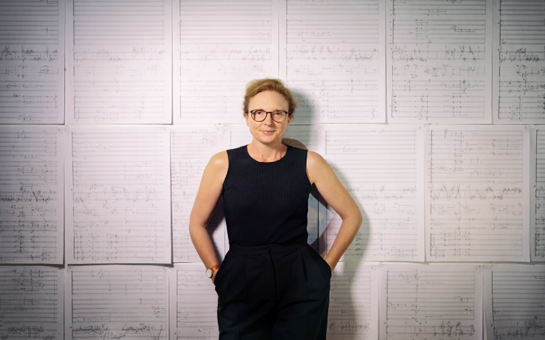- Rebecca Saunders
Lash (2025)
(Acts of Love (Opera in Three Acts))- Henry Litolff’s Verlag GmbH & Co. KG (World)
- actor,2S,A,2eorg,egtr(I:syn,pf.II:syn,pf) + 2(I:pic,bfl.II:pic,bfl).1.5(III:bcl.IV:bcl.V:cbcl).0.tsx/4.3.3(III:btbn).0/9perc/hp/acn/str(8.8.8.8.6)
- 2 Sopranos, Alto, Actor + 2 BX3 Korg Organs (both doubling Synth; Act 3 = 2 Grand Pianos), Electric Guitar
- 1 hr 50 min
- Ed Atkins and Rebecca Saunders
- English
Programme Note
Lash addresses the fundamental question how human beings experience themselves as loving, desiring, transient and moral creatures. It examines our physicality, as one of the inalienable prerequisites of this experience: our bodies make us part of the world, and at the same time, the only way we can experience the world is through our bodies. Our body must always be considered as an experiencing subject and an object experienced by others, in the same manner as our two hands, when interlocking, are both clasping and clasped – an ambiguity which cannot ultimately be resolved using the categories of subject and object. This existential and fundamental experience of humanity is brought to life.
The piece opens with a cascade of text and questions phrased by the actor, as one of the protagonist’s embodiments. Each question opens with the same formula: “I wanted to ask…”: in a sheer endless sequence of variations, they express suppressed desires and longings, now impossible to contain, that the protagonist feels vis-à-vis another beloved and desired, but no longer present, person. Taking this as their point of departure, memories unfold in a sequence of scenes depicting her longing for love and sex just as much as the failure of her longing, with the tragedy of death hidden just beneath the surface. The mosaic of these snapshots recounts her life, but also reconstructs the reason and process of death, and the inherent transience of the human experience. Furthermore, the opera questions the perception and self-perception of one’s own body: as a body that is exhibited on stage, but also, adopting a micro-perspective and viewing minute physical details such as hairs, eyebrows, eyelashes, eyeballs or patches of skin, focusing on those parts of the body with which we exist in the world, but also use to feel, touch, see, smell and hear the world. Thus, a deeply sensual interplay embracing sex, body, love, and death unfolds – with a surprising ending.
Ed Atkins’ language is characterized by a sensuous, voluptuous lyricism, a high level of nuance, physicality and ambiguity in the dreams, images and story it encapsulates and expresses; at the same time, it also has great expressivity and musicality. This makes it an ideal starting point for Rebecca Saunders’ music with its enormous sonic and sensuous power. She creates different sound worlds and expression for each of the four performers within a large, three-act structure. In the pit, a symphonic orchestra accompanies the action, expanded by a three-part solo ensemble including electric guitar and two synthesizers. During the third act the singers and musicians from the orchestra are positioned within and around the auditorium, acoustically expanding the space of the stage, creating a resounding sonic architecture. The opera will be directed by Dead Centre, a theatre collective which has made a name for itself in recent years with visually impressive and idiosyncratic interpretations of contemporary musical theatre works, such as Olga Neuwirth’s BÄHLAMMS FEST at the 2021 Ruhrtriennale or the world premiere of Giorgio Battistelli’s IL TEOREMA DI PASOLINI at the Deutsche Oper Berlin in 2023.
Media
Scores
Reviews
More Info

- Rebecca Saunders’ first opera Lash premieres at Deutsche Oper Berlin
- 3rd June 2025
- On June 20, Rebecca Saunders’ first opera Lash – Acts of Love celebrates its debut at Deutsche Oper Berlin. Based on an original text by Ed Atkins, the libretto was co-written by Saunders and Atkins.

 Located in the UK
Located in the UK
 Located in the USA
Located in the USA
 Located in Europe
Located in Europe